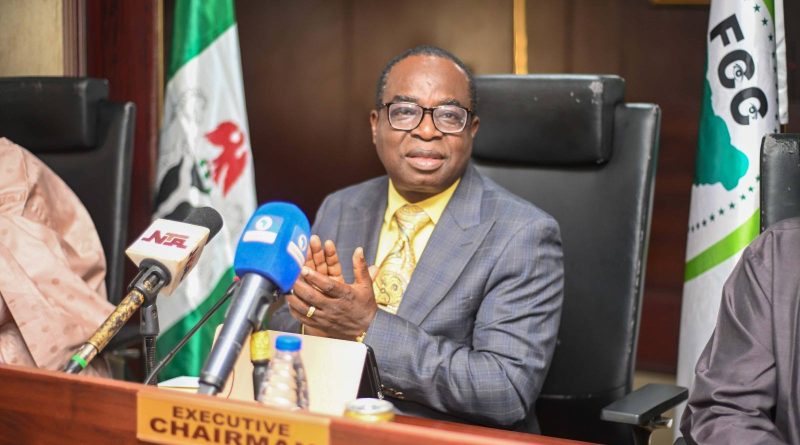Tinubu’s appointments in favour of North more than South
The Acting Chairman of the Federal Character Commission, Kayode Oladele, said recent federal appointments under President Bola Tinubu show a numerical tilt in favour of the north more than the south.
Mr Oladele said the Tinubu administration strives to uphold fairness, inclusion, and national balance.
In a statement sent to PREMIUM TIMES, Mr Oladele said available data reflect deliberate efforts to ensure equitable representation across Nigeria’s six geopolitical zones.
He spoke at the opening of a one-day workshop on “Strengthening Leadership and Management Excellence in the Federal Character Commission in Line with the Renewed Hope Agenda.”
Cabinet positions
PREMIUM TIMES analysis of the figures shows that cabinet appointments under President Bola Tinubu are led by the North-west and South-west, each with 11 ministers, representing 22.9 per cent of the cabinet.
The North-central follows with eight ministers (16.6 per cent), while the North-east accounts for seven (14.5 per cent).
The South-south has six ministers (12.5 per cent), and the South-east trails with five (10.4 per cent), bringing the total number of cabinet members to 48.
Federal CEOs, DGs and ES
Beyond the cabinet, data from the Federal Character Commission indicate that the North-west also holds the largest share of federal leadership positions, with 157 appointments (22.1 per cent).
The North-central follows with 139 positions (19.5 per cent), and the South-West with 132 (18.5 per cent).
The North-east accounts for 105 positions (14.7 per cent), while the South-South and South-East have 91 (12.8 per cent) and 88 (12.4 per cent) respectively.
Overall, the northern region accounts for 401 positions, representing 56.3 per cent of the total, while the southern region holds 311 positions, or 43.7 per cent.
Permanent Secretaries
In the distribution of Permanent Secretaries, the North-central leads with 19.5 per cent, while the North-east, North-west, and South-south each account for 17.1 per cent. The South-east and South-west follow with 14.6 per cent apiece.
“These figures provide clear evidence of deliberate inclusion and underscore the President’s commitment to national balance and faithful implementation of the Federal Character principle,” Mr Oladele said.
The data presented by Mr Oladele does not include the appointments of special advisers, senior special assistants, and other presidential aides made by Mr Tinubu. It also excludes the service chiefs and the heads of law enforcement and security agencies.
While the data show that the North leads the South in overall appointments, the South-east remains the most underrepresented region across all categories.
The FCC, established under Section 14(3) of the 1999 Constitution and its enabling Act, remains the primary institution mandated to promote and enforce equitable distribution of positions and socio-economic benefits among the country’s federating units.
According to Mr Oladele, “equity is the foundation of hope,” and citizens’ trust in government depends on visible fairness in appointments, contracts, and opportunities.
“The FCC must embody the very principles it was created to uphold: leadership, fairness, efficiency, and professionalism,” he told staff of the FCC, including directors, commissioners, and staff of the Commission.
Institutional reforms underway
Mr Oladele outlined a series of reform initiatives he had introduced since he assumed office to strengthen institutional efficiency and accountability.
One of these is the reinstatement of the Committee System, which assigns oversight of specific Ministries, Departments, and Agencies to Commissioners for closer monitoring and participatory decision-making.
He also cited enhanced stakeholder engagement with key institutions, including the National Assembly, Office of the Head of Civil Service, Police Service Commission, NSIA, DSS, ICPC, NYSC, and the Federal Road Safety Corps, to harmonise recruitment processes and deepen transparency.
Regarding staff welfare, the Commission has implemented payment of arrears to retired directors and improved allowances for corps members and staff while embarking on the digital modernisation of its data systems.
A key project, he announced, is the planned Integrated Federal Character Compliance Database (IFCCD), which will enable real-time tracking of compliance levels across all MDAs.
ALSO READ: Confusion as Tinubu reappoints, sacks Federal Character Commission chair in four hours
“The goal is to make our monitoring and enforcement evidence-based, transparent, and efficient,” he said in the statement sent to PREMIUM TIMES.
Leadership, ethics and capacity building
The workshop, Mr Oladele said, forms part of a broader human resource development plan aimed at building ethical, competent, and innovative leadership across the Commission’s zonal and state offices.
He urged participants to “embrace excellence as the new standard,” emphasising values such as fairness, accountability, teamwork, and innovation.
“Leadership is not about authority; it is about service, empathy, and responsibility,” he said. “Every officer of the Commission is a custodian of national trust.”
Looking ahead, the FCC plans to measure the real impact of its interventions through periodic Federal Character Impact Reports, which will assess compliance across sectors, highlight best practices, and identify gaps.
Mr Oladele said this will help expand public awareness about the Federal Character Principle and stimulate dialogue on fairness, merit, and inclusivity in governance.
Concluding his remarks, the FCC chairman called on all senior managers to align their leadership ethos with the Renewed Hope philosophy by leading with integrity and managing with excellence.
“Our success will not be measured by the number of circulars we issue, but by the trust we rebuild among citizens and the harmony we nurture across the federation,” he said.
Mr Oladele reaffirmed that the Commission will continue to collaborate with government agencies, universities, and civil society partners to institutionalise fairness, transparency, and meritocracy in public appointments.
“Let us commit ourselves anew to lead with integrity, manage with excellence, and serve with fairness. This is the essence of the Renewed Hope Agenda.”

